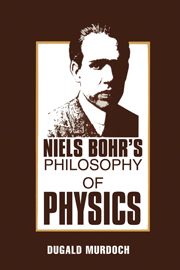Book contents
- Frontmatter
- Contents
- Dedication
- Preface
- Acknowledgements
- 1 Wave-particle duality
- 2 Niels Bohr and wave-particle duality
- 3 From duality to complementarity
- 4 The meaning of complementarity
- 5 The foundations of kinematic-dynamic complementarity
- 6 Bohr's theory of measurement
- 7 Bohr's theory of properties
- 8 Einstein versus Bohr
- 9 The sequel to the Bohr-Einstein debate
- 10 Bohr's philosophy of physics
- 11 An appraisal of Bohr's philosophy of physics
- Notes
- Index
11 - An appraisal of Bohr's philosophy of physics
Published online by Cambridge University Press: 01 June 2011
- Frontmatter
- Contents
- Dedication
- Preface
- Acknowledgements
- 1 Wave-particle duality
- 2 Niels Bohr and wave-particle duality
- 3 From duality to complementarity
- 4 The meaning of complementarity
- 5 The foundations of kinematic-dynamic complementarity
- 6 Bohr's theory of measurement
- 7 Bohr's theory of properties
- 8 Einstein versus Bohr
- 9 The sequel to the Bohr-Einstein debate
- 10 Bohr's philosophy of physics
- 11 An appraisal of Bohr's philosophy of physics
- Notes
- Index
Summary
Now that my account of Bohr's philosophy of physics has been completed, it remains for me to give a general assessment of it. What value should we assign to Bohr's main ideas – the notions of correspondence and complementarity? How does his interpretation of quantum physics fare in comparison with some of its rivals? What should our assessment of the Bohr–Einstein debate be? I shall take up these questions in the reverse order.
Einstein or Bohr? The final verdict
The Bohr–Einstein debate is primarily a dispute about the philosophical foundations in terms of which the interpretation of quantum mechanics should be based: specifically it is a dispute about the intrinsic-properties theory, i.e. about the scope of a realist interpretation of quantum mechanics. Einstein wished to maintain the two realist theses, the intrinsic-properties theory and the objective-values theory, whereas Bohr wished to hold only the latter. My own philosophical leanings are in the direction of realism. To my mind the notion of a physical reality the existence and constitution of which are independent of human thought and perception is coherent and plausible: what physical objects there are, and what properties they have, is not determined by human thought or perception, or by human practical interests. I have sympathy, therefore, with Einstein's position concerning the indefinability thesis and the question of the completeness of quantum mechanics.
- Type
- Chapter
- Information
- Niels Bohr's Philosophy of Physics , pp. 236 - 258Publisher: Cambridge University PressPrint publication year: 1987



